About this blog…
Welcome to our project space! Here, we will be documenting ideas, updates, and the progress of our community gardens accessibility project throughout the term.
Who we are…
We are Group 16 from LFS 350…here is a group picture of us!
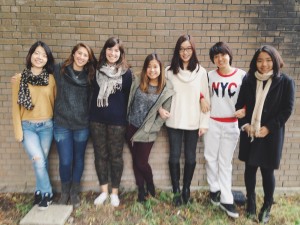
From left to right: Yvaine Ye, Ana Gargollo, Victoria Janzen, Mary Cao, Lydia Liu, Kathy Wang, Cheerie Fan
Yvaine Ye
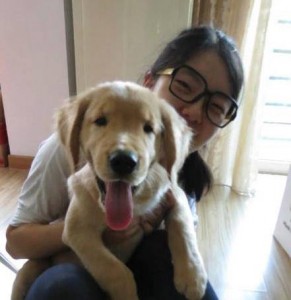
Hi everyone, my name is Yvaine. I am currently a third year FNH student. As a matter of fact, the reason I chose to apply to LFS back in high school was that I was a foodie (like probably everyone else here)! The sad thing is, after taking many nutrition courses, I have not enjoyed a fatty burger with a side of fries for years. I would definitely call FNH a life-changing major for ruining my fun.
Ana Gargollo
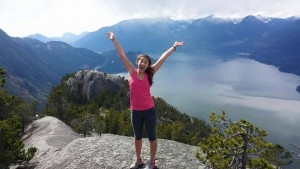
Hi! My name is Ana and I am currently in my second year of the Global Resource Systems program, but third year overall at UBC. I am very interested in sustainability and I am actually specializing in Urban Sustainability in Latin America. I think urban food systems are a major part of this and I am very interested in urban farming, like community gardens, personal gardens and edible landscaping. I also think zero-waste initiatives are very cool, especially those regarding the massive amounts of food being wasted by industry and households alike.
Victoria Janzen
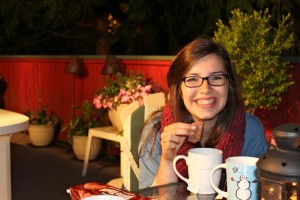
Hi! My name is Victoria, and I am studying food systems and nutrition in North America through the Global Resource Systems program. I’m interested in finding solutions to the obesity epidemic in our communities through improving awareness and access to sustainable food sources. I believe in creating healthy communities that are actively involved in growing and creating delicious foods.
Mary Cao
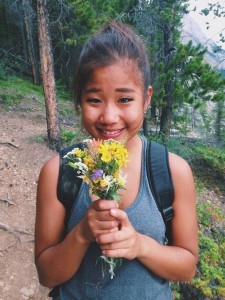
Hey, Mary here! I am a third year FNH student aspiring to enter the dietetics program, and hoping to someday specialize in pediatric nutrition! I love to hike in the summer and shred some serious pow in the winter. I’m super excited about this group project and I know we will accomplish great things!
Lydia Liu
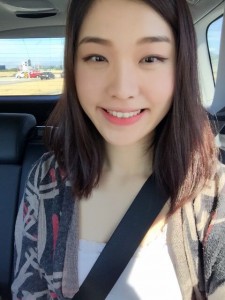
Hi! My name is Qianru and I go by Lydia. I’m majoring in Nutritional sciences and I’m interested in food and its impact on our health and wellbeing. Growing up, I have always considered food as an important part of my life. I enjoy dining out with my friends and family but I am also fond of trying new recipes at home! I am very much intrigued by the science behind food and cooking. However to me, food is more than just a bunch of nutrients I put in our body to sustain my life; it also creates memories, social bonds and joy.
Kathy Wang
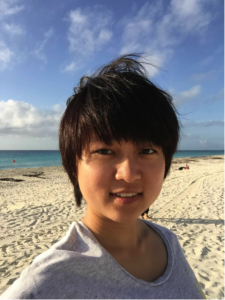
Hello! I am Kathy and my major is FNH. After studying nutrition, I realized the importance of a balanced diet. I am particularly interested in supplementation as an alternative source of essential nutrients. I enjoy many food-related activities such as cooking and gardening vegetables. I am looking forward to connect with community gardens through this project.
Cheerie Fan
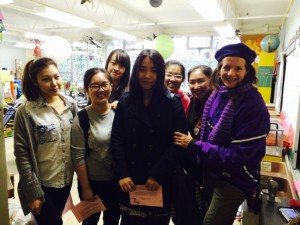
Hi there, my name is Cheerie and my major is Nutritional Science. My interests lie in the diet’s effects on people’s daily performances and multicultural foods and ingredients. As an international student, I’ve been amazed by all the different kinds of culinary traditions and cultural stories behind foods here since moving to Vancouver.
Our project…
The objective of our project is to assess the language barriers in the application process for Vancouver Community Gardens. We want to see if the demographic of neighbourhoods is reflected in community garden participation to see if the application process is a barrier to diversity in community gardens. We wish to assess the multilingual assets that community gardens have for members whose primary language isn’t English. We hope to compile suggestions for the city of Vancouver and community gardens of ways they could improve access for immigrant communities, with the ultimate goal of encouraging community involvement for minority groups in Vancouver. Since we will be surveying community gardens across Vancouver, our community partner will hopefully be a contact at the City of Vancouver who orchestrates the community gardens.
Why a community gardens project?
As a group, we share common interests regarding to urban farming issues. We think that it is important to provide accessibility to all Vancouver residents to fresh produce and community gardens. Our group is consists of people with multiple cultural backgrounds, and as a result, we recognize that although Vancouver is one of the most ethnically and culturally diverse cities in Canada. We would like to study the struggles faced by the minority groups and possibly provide a practical strategy to improve their access to community gardens.
It wasn’t until two full tutorial sessions of brainstorming and discussions that our group came to a consensus on a project. The abundance of great ideas and different interests within our group made it difficult to find a primary focus. At first, ideas varied from implementing an after school gardening program, creating a gardening manual, and writing a vegetable garden cookbook. After listening to Ernesto Sirolli’s TED Talk, we realized that instead of coming into a community and implementing a program or giving them a product that may or may not be useful to them, it would be more effective to dive into the roots of an issue and address basic needs first. This is when we shifted our focus to Vancouver’s multiculturally diverse demographics, and how we could make our community gardens accessible to everyone, especially for those who speak a different primary language.
We want to ensure that minority groups in Vancouver have equal access to community gardens, as the needs of the minority are sometimes overlooked. What’s more, most of the minorities are immigrants or those who have recently moved to Vancouver, and there may be language and cultural barriers that may restrict them from communicating with local people and expressing their needs. The second reason is that many of our group members are from different countries and thus bilingual. Having bilingual group members can be an advantage for us to easily talk to those immigrants who express an interest in appylying for community gardens, but are unsure of where to start.
What are your group’s goals for this project?
Our goals for this project are focused on increasing accessibility to community gardens in Vancouver, especially regarding access for minorities in the region. We believe urban farming is a great asset to any community, and believe immigrants, both recent and old-timers, should have access to this. We also wish to increase awareness of the benefits of community gardens, emphasizing the importance of people engaging in the food production of their own community. Through this improved accessibility and awareness, we wish to achieve the goal of the Vancouver Food Strategy of empowering residents, encouraging them to take control of their food sources and nutrition.
What does your group wish to gain from this project?
By working on this project, we hope to obtain a better understanding of community food systems and asset-based community development principles. We hope to apply the concepts and skills we have learned in LFS course series to strengthen connections, especially among minority groups, in a community food system. This hands-on experience will help us understand the obstacles and uncertainties we have to face when it comes to developing a community based program and hopefully this will give us the confidence to tackle similar challenges in the future. We also hope to gain insight into the difficulties that new immigrants face if they want to participate in their community gardens. As mentioned before, we aim to build or strengthen connections between local residents and their community food systems. And with the background of Vancouver being one of the most multicultural cities in Canada, we feel the need to address this issue that is holding new immigrants back in community involvement, which is the inadequacy of translated materials for minority groups.
How will your group ensure your project’s success?
Utilizing the principles of Asset-Based Community Development, we hope to build on the pre-existing community gardens within the city and increase their accessibility to non-English speaking residents. We plan to use resources within the university and cultural centres to achieve this our project goals.